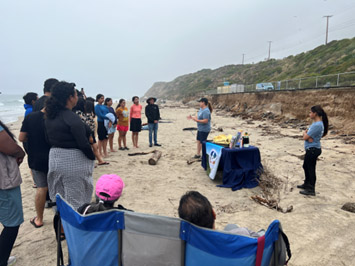Building a Brighter Future for Wildlife Through Education
By Cambria Wells, Education and Outreach Manager

Marine Mammal department educates about the native marine wildlife
Like many nonprofits, CWC’s greatest hope is for our services to be a last resort. We care deeply for our patients and treasure our experiences with them, but they arrive in our care due to accidents and illnesses. A critical part of our work is educating our community about the impacts humans have on our wild neighbors, and how we can turn toward a more positive future for us all. As a wildlife rehabilitation facility, CWC has a unique perspective and individual patients’ stories to share. As a nonprofit, we want as many people as possible to know about the free services we offer to help wildlife in need. With nearly 30 years of experience in the rehabilitation field, we are committed to fostering the next generation of professionals. We believe it’s essential for our educational audience to be aware of the diverse career paths available in wildlife rehabilitation and conservation.
CWC is reaching for these goals through broadly appealing education programs that we’ve designed over the course of our education department’s pilot year. We are focusing on teaching tools which appeal to the senses. Replicas of native animal skeletons and eggs, sterilized remnants (e.g. feathers, owl pellets), and photos of animals in our care offer unique ways to experience our patients’ lifestyles and personalities. We pair these tools with discussion, inquiry based learning, and themed games to inspire ongoing learning and daily awareness of the wilderness in our neighborhoods. So far this year the CWC Education department has reached over 1,000 summer camp participants, 100,000 market and festival attendees, and hundreds via presentations for private groups. The conversations we have had with community members and supporters make us hopeful for a future where the human world is a little less dangerous for our wild neighbors.
